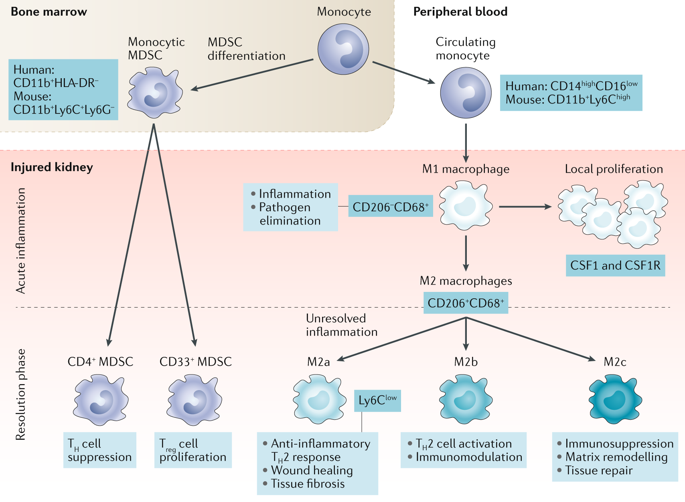Nature Reviews Nephrology ( IF 28.6 ) Pub Date : 2019-01-28 , DOI: 10.1038/s41581-019-0110-2 Patrick Ming-Kuen Tang , David J. Nikolic-Paterson , Hui-Yao Lan

|
Macrophages have important roles in immune surveillance and in the maintenance of kidney homeostasis; their response to renal injury varies enormously depending on the nature and duration of the insult. Macrophages can adopt a variety of phenotypes: at one extreme, M1 pro-inflammatory cells contribute to infection clearance but can also promote renal injury; at the other extreme, M2 anti-inflammatory cells have a reparative phenotype and can contribute to the resolution phase of the response to injury. In addition, bone marrow monocytes can differentiate into myeloid-derived suppressor cells that can regulate T cell immunity in the kidney. However, macrophages can also promote renal fibrosis, a major driver of progression to end-stage renal disease, and the CD206+ subset of M2 macrophages is strongly associated with renal fibrosis in both human and experimental diseases. Myofibroblasts are important contributors to renal fibrosis and recent studies provide evidence that macrophages recruited from the bone marrow can transition directly into myofibroblasts within the injured kidney. This process is termed macrophage-to-myofibroblast transition (MMT) and is driven by transforming growth factor-β1 (TGFβ1)–Smad3 signalling via a Src-centric regulatory network. MMT may serve as a key checkpoint for the progression of chronic inflammation into pathogenic fibrosis.
中文翻译:

巨噬细胞:肾脏炎症和纤维化的多功能参与者
巨噬细胞在免疫监视和维持肾脏稳态中具有重要作用。它们对肾损伤的反应在很大程度上取决于损伤的性质和持续时间。巨噬细胞可以采用多种表型:在一种极端情况下,M1促炎细胞有助于清除感染,但也可以促进肾脏损伤。在另一个极端,M2抗炎细胞具有修复表型,可以促进对损伤反应的消退阶段。另外,骨髓单核细胞可以分化成髓样抑制细胞,可以调节肾脏中的T细胞免疫力。但是,巨噬细胞也可以促进肾纤维化,这是发展为终末期肾脏疾病的主要驱动力,而CD206 +在人类和实验疾病中,M2巨噬细胞的一部分与肾纤维化密切相关。肌成纤维细胞是导致肾纤维化的重要因素,最近的研究提供了证据,表明从骨髓中募集的巨噬细胞可以直接转化为受损肾脏内的成纤维细胞。此过程称为巨噬细胞到成肌纤维细胞的转化(MMT),并通过以Src为中心的调节网络通过转化生长因子-β1(TGFβ1)-Smad3信号传导来驱动。MMT可能是慢性炎症发展为病原性纤维化的关键检查点。




















































 京公网安备 11010802027423号
京公网安备 11010802027423号